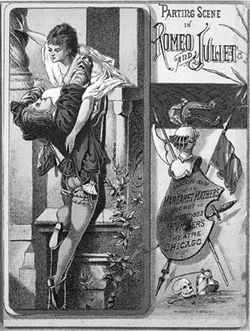Since Dana Gioia was named chairman of the National Endowment for the Arts in January, the organization has awarded nearly $1 million to poets and translators of poetry and over $2 million to literary arts organizations. But the highest profile project of Gioia’s term so far begins this month, when six theater companies—from New York City; Chicago; Minneapolis; Little Rock, Arkansas; and Portland, Oregon—will begin a yearlong tour of 100 small and midsized cities across the U.S. to perform a selection of plays by William Shakespeare. A seventh theater company will tour 16 U.S. military bases.

“We want to bring the best possible works of art to the broadest possible audience,” says Gioia. “We chose Shakespeare because of his importance to the evolution of American theater and literature.” The project, “Shakespeare in American Communities,” will feature a cross section of the playwright’s tragedies, comedies, and histories, including Othello, Romeo and Juliet, Richard III, and A Midsummer Night’s Dream. The tour will also offer artistic and technical workshops and symposia about the productions. Teachers at schools in the selected cities will receive a kit with fact sheets on Shakespeare’s life and on Elizabethan theater, suggestions for classroom activities, and educational CDs and DVDs, featuring comments from Harold Bloom, the author of more than 20 books of literary criticism, including Shakespeare: The Invention of the Human (Riverhead Books, 1998).
Such tours were once a vital component of artistic outreach: From the Louisiana Purchase in 1803 through the end of the 19th century, American and European troupes traveled across North America along the trade, shipping, and railroad routes, bringing classic as well as popular works to newly built theaters and opera houses. “Theatrical touring is an artistic enterprise that has dried up because of expense and logistical difficulties,” says Gioia. “But touring is important for theater companies and for the communities they visit. We want to revive that tradition.”
To help coordinate the tour, the NEA enlisted Arts Midwest, an organization serving Illinois, Indiana, Iowa, Michigan, Minnesota, North Dakota, Ohio, South Dakota, and Wisconsin. “We’ve always been involved in organizing tours in the Midwest,” says Susan Chandler, assistant director of Arts Midwest. “So when the NEA announced that it was looking for a partner to organize the Shakespeare tour, it was natural for us to take on that role, even though this tour extends beyond the Midwest.”
“Shakespeare in American Communities” reflects Gioia’s high ambitions for the NEA, which has had its share of critics since it was established in 1965. “The NEA has been through a tough recent history,” Gioia says. “It needs to have its morale rebuilt, its programs focused, and its confidence increased.” Throughout the 1980s and 1990s the NEA’s role was criticized, as artists whom many considered controversial, including Robert Mapplethorpe, Ron Athey, and Andrew Krasnow, received funding from the organization. As public criticism increased, the NEA’s budget shrank, undergoing its most substantial cut in 1996, when it received $99.5 million (down from $162.3 million the previous year).
Prior to becoming chairman of the NEA, Gioia was known as a poet, translator, and author of the 1991 Atlantic Monthly article “Can Poetry Matter?” In that essay, Gioia argued that poetry had shifted from mainstream artistic and intellectual life into a subculture of poets writing for other poets, and called for increased conversation between poets and the public. As chairman of the NEA, he has introduced a similar debate, questioning the organization’s relatively recent transformation into an isolated entity supporting art for a very limited audience. “We need to earn the trust and respect of the American people,” he says. “The NEA exists to serve all Americans, and it must create programs of indisputable artistic merit and broad national reach. Art without an audience is a diminished endeavor.”
Gioia’s goal to establish the NEA as an arts institution serving all Americans seems to resonate with Congress, as the organization’s budget is now slowly but steadily increasing. The 2003 budget is $115.7 million (up from $115.2 million in 2002), and President Bush has requested that Congress allot $117.5 million to the organization in 2004. Gioia says it is difficult to isolate the percentage of the budget dedicated to literature, since various art forms often overlap. “The Shakespeare tour, for example, technically benefits theater, but it’s also a literary endeavor because it exposes audiences to great literature.”
In addition to adopting projects that indirectly benefit literature, Gioia says the NEA’s direct financial support of poets, fiction writers, creative nonfiction writers, translators, and literary organizations remains strong. “One of the good things about having a literary chairman is that I’m conscious of literary presses, festivals, and other areas of literary culture,” he says. “I can help ensure that literary people and programs get their fair share.” In the coming years, Gioia hopes to create exchanges between American and foreign artists, particularly writers. He is currently considering the possibilities of fostering an artistic dialogue with Russia and Mexico.
For more information about “Shakespeare in American Communities,” visit www.nea.gov.
Dalia Sofer is a freelance writer who lives in New York City.








